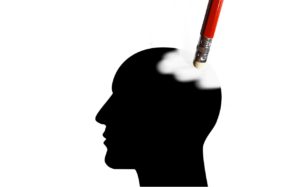Alzheimer’s Disease (AD) is the most common form of dementia and presents as memory loss along with one or more other types of cognitive impairment; such as communication, attention, self-monitoring, judgment, motor skills, and trouble performing daily activities. Memory loss usually begins aggressively and can advance over approximately 8-10 years. Everyone is different, so some patients can progress more slowly over time while others can progress more aggressively and quickly.
In the beginning, language and communication shortcomings are noticed. The patient may struggle with reading comprehension or comprehending conversation. You may notice repeated questions and statements and trouble with articulate speech. Social behaviors may remain normal until later progression, and aggression or withdrawal can occur. Personality and behavioral changes as well as problems in judgment occur with the progression of the disease.
An imbalance in nerve cell signaling is caused by AD. The brain produces signals that aid in memory making. The human brain processes information and forgets and stores accordingly. Non-important information is forgotten and is referred to as memory breaking. Important information is stored and is referred to as memory making. When these nerve connections are not functioning effectively, the brain loses the ability to retain any memories at all.
Finding the root cause of why a patient is developing cognitive deterioration is the best holistic approach. Causes can be anywhere from metal toxicity, inflammation, infection, stress, and abnormal brain growth. Once deficiencies have been determined, a course of treatment can be implemented. Testing for nutritional deficiencies, hormone imbalance, and heavy metal toxicity is a good place to begin. Early detection and taking steps to preventing the disease before it starts can alleviate the disease. If treatment is delayed and the disease gets into the later stages, the brain has been significantly affected and it’s more difficult to see positive results.
Chronic infections: If bacteria, viruses, yeasts, parasites, or mold are present in the body, these need to be evaluated and treated. Natural anti-microbials such as herbs, foods, supplements, and essential oils can be very effective and help reduce the infection and boost the immune system.
Toxic heavy metals: There are many ways that heavy metals can enter the body. Food, water, air, absorption through the skin through deodorant or mercury fillings, occupation, lead pipes, and cooking utensils are just a few ways that one can be exposed. They become toxic to us because we cannot metabolize them, and they accumulate in different fatty parts of the body. Unfortunately, because the brain is a fatty organ, these metals can accumulate in the brain during a person’s lifetime and can be the cause of AD if they are not detoxified from the body. Testing can determine the levels of toxicity in the body and can be safely removed with the use of nutrients and herbs.
Stress: Testing hormone levels is also important when evaluating the cause for symptoms. Thyroid, cortisol, and other hormone levels should be accessed. This will help determine how to go about maintaining and balancing hormone levels. Diet and a regiment of herbs and supplements can help support the body in balancing hormone production.
Re-hydrating the body, detoxification, avoiding heavy metals, and nutritional balance can produce great results in patients with brain deficiencies. Diet with high levels of fats and proteins are effective. Make sure to get a balanced diet and eat plenty of foods that feed the brain. Foods that contain B vitamins, protein, fats, and omega 3 fatty acids have been found to be highly effective.
Managing stress is a major part of prevention. Hormone levels should be tested and regulated. High levels of stress over time can actually shrink parts of the brain that are responsible for memory, learning, and overall cognitive function. Practice habits that help to manage stress, whether its meditation, yoga, journaling, walking, or exercise. Proper sleep is also a key contributor to stress reduction. Relaxing bedtime routines can help us have more restful sleep and keep stress levels in check. Studies have shown that those who begin to have symptoms of cognitive dysfunction first had high levels of oxidative stress in the brain. Spiritual habits have been proven effective. Defining our sense of purpose, love and service to others, and spiritual practice can help our self awareness and cognitive abilities. Nourishing the brain physically and mentally are the key ingredients to maintaining brain health. The goal is not to reverse symptoms but to do what is necessary to prevent them from even developing.
Most people do not realize the decline in impairment before damage is done. Loved ones may begin to notice the first sign of impairment which is memory loss or unusual behaviors. This is why it is so important to take action and prevent before the symptoms occur. Once symptoms occur, damage has been done. If early detection is noticed, take action immediately so that prevention of further decline can be taken.


